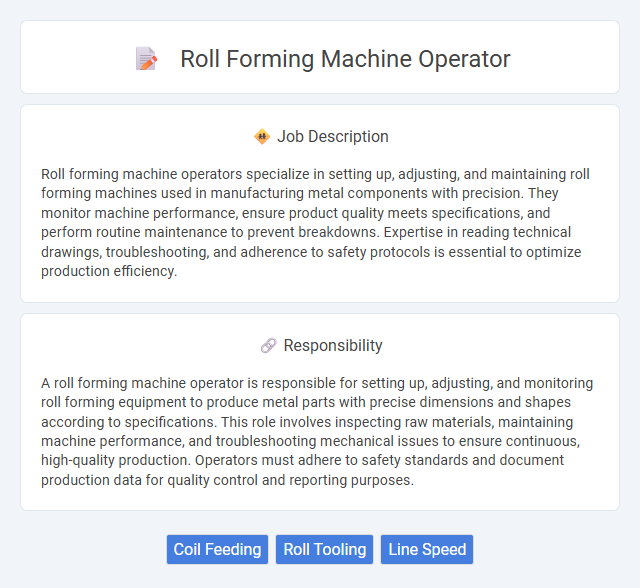
Roll forming machine operators specialize in setting up, adjusting, and maintaining roll forming machines used in manufacturing metal components with precision. They monitor machine performance, ensure product quality meets specifications, and perform routine maintenance to prevent breakdowns. Expertise in reading technical drawings, troubleshooting, and adherence to safety protocols is essential to optimize production efficiency.
People with good physical stamina and attention to detail are likely suitable for a roll forming machine operator job, as it often requires standing for long periods and monitoring machinery operation. Those who prefer repetitive tasks and can maintain focus in noisy, industrial environments may find this role fitting. Individuals with limited mobility or low tolerance for monotonous work might face challenges adapting to the demands of this position.
Qualification
A Roll Forming Machine Operator must have a high school diploma or equivalent, with technical training in metal fabrication or machinery operation preferred. Proficiency in reading blueprints, mechanical aptitude, and experience in operating roll forming machines are critical qualifications. Strong attention to detail, problem-solving skills, and the ability to perform routine maintenance on machinery enhance job performance and safety.
Responsibility
A roll forming machine operator is responsible for setting up, adjusting, and monitoring roll forming equipment to produce metal parts with precise dimensions and shapes according to specifications. This role involves inspecting raw materials, maintaining machine performance, and troubleshooting mechanical issues to ensure continuous, high-quality production. Operators must adhere to safety standards and document production data for quality control and reporting purposes.
Benefit
Working as a roll forming machine operator likely offers steady employment opportunities due to demand in manufacturing and metal fabrication industries. Benefits may include competitive wages, hands-on skill development, and the potential for overtime pay. Operators might also experience job stability and access to healthcare or retirement plans depending on the employer.
Challenge
Operating a roll forming machine likely involves managing complex metal shaping processes that require high precision and constant attention to detail. The challenging aspect of this role may stem from maintaining optimal machine settings to prevent material waste and ensure product quality. Operators probably face difficulties in troubleshooting mechanical issues quickly to minimize downtime in a fast-paced manufacturing environment.
Career Advancement
Roll forming machine operators can advance their careers by gaining expertise in CNC programming and machine maintenance, leading to roles such as production supervisors or quality control specialists. Mastery in interpreting technical blueprints and implementing process improvements increases their value within manufacturing settings. Pursuing certifications in safety standards and lean manufacturing further enhances promotion potential and salary growth.
Key Terms
Coil Feeding
A Roll Forming Machine Operator expertly manages coil feeding to ensure continuous and precise material flow into the roll forming machine, minimizing downtime and maintaining product quality. This role requires careful alignment, tension control, and monitoring of coil properties such as thickness and width to optimize the forming process. Proficiency in coil handling equipment and adherence to safety protocols are critical for efficient production and preventing material waste.
Roll Tooling
Roll forming machine operators specialize in setting up and maintaining roll tooling to shape metal coils into precise profiles. Expertise in adjusting roll tooling components ensures consistent product dimensions and reduces material wastage. Proficient operators routinely inspect tooling wear and perform timely replacements to maintain optimal machine performance and product quality.
Line Speed
A Roll forming machine operator manages the line speed to ensure consistent metal shaping and prevent material defects. Precise control of the line speed optimizes production efficiency and maintains quality standards throughout the continuous forming process. Monitoring and adjusting the speed based on material thickness and machine settings is crucial for minimizing downtime and maximizing output.
 kuljobs.com
kuljobs.com